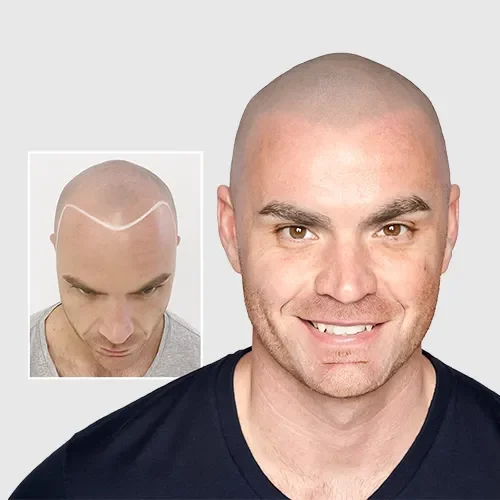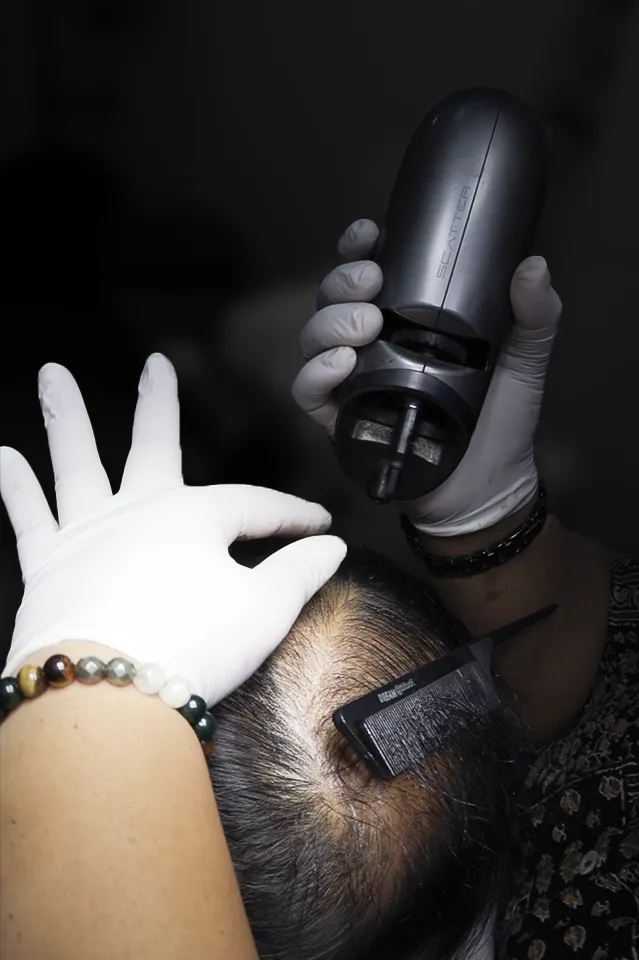Scalp Micropigmentation

Scalp Micropigmentation (SMP)
Scalp Micropigmentation (SMP) as a revolutionary solution for individuals dealing with hair loss, offering a non-invasive and highly effective way to restore the appearance of a full head of hair.
This innovative technique involves the application of specialized pigments to the scalp in a precise and controlled manner, replicating the look of natural hair follicles.
It becomes evident that its transformative camouflage effects and versatility make it a compelling option for those seeking to address the aesthetic challenges associated with hair loss.
it can provide depth behind thinning hair to create the appearance of a more dense head of hair.
SMP is different from a tattoo. SMP uses a fine needle, which injects a needle to deposit medical-grade pigment on the desired areas of the scalp. The dots vary in size, angle, and depth to provide a natural, hair-like appearance pigment into the dermis layer of the skin. It does not inject as deep as a traditional tattoo.
The SMP procedure itself is performed using specialized equipment, including micro-needles and pigment delivery systems, to create tiny, precision-placed dots of pigment on the scalp. These dots mimic the appearance of natural hair follicles, resulting in the illusion of a denser, fuller head of hair. The technician carefully adjusts the size, shape, and density of the pigment dots to replicate the client’s natural hair pattern, ensuring seamless integration with any existing hair and a realistic overall appearance.
People who want to change the appearance of balding or thinning hair may choose to have SMP. SMP may be suitable for people who have:
- Alopecia
- Male or Female Pattern Hair Loss
- Hair Loss From Cancer Treatments
Advantages of Scalp Micropigmentation (SMP)
- SMP is its versatility and suitability for a wide range of hair loss conditions. Whether the client is experiencing thinning hair, receding hairlines, bald spots, or complete baldness, SMP can be tailored to address their specific needs and provide an aesthetically pleasing solution.
- SMP is effective for both men and women of all ages and ethnicities, making it an inclusive option for individuals seeking to enhance their appearance and regain confidence.
- SMP had long durability and low maintenance requirements. Unlike traditional hair restoration methods such as hair transplants or topical treatments, SMP requires minimal upkeep and offers long-lasting results.
- The pigments used in SMP are specially formulated to be fade-resistant and remain stable over time, ensuring that the restored hairline maintains its natural appearance for years to come.
- Additionally, SMP is not affected by factors such as sweating, swimming, or exposure to sunlight, making it a practical and hassle-free solution for individuals with active lifestyles.
- Furthermore, SMP offers a safe and non-invasive alternative to surgical hair restoration procedures. The procedure does not involve incisions, sutures, or anesthesia, eliminating the risk of complications and reducing downtime. Most clients can resume their normal activities immediately after the SMP session, with minimal discomfort or side effects.

Disadvantages of Scalp Micropigmentation (SMP)
It’s essential to acknowledge potential disadvantages and considerations associated with the procedure:
1. Limited Hair Growth: SMP does not promote actual hair growth. Instead, it creates the illusion of hair density by tattooing pigment onto the scalp.
2. Permanent Nature: SMP is considered a permanent procedure, as the implanted pigments remain in the scalp indefinitely. While touch-up sessions can help maintain the desired appearance, reversing or removing SMP is challenging and may require laser tattoo removal, which can be costly and uncomfortable.
3. Scalp Sensitivity: Some individuals may experience scalp sensitivity or discomfort during and after the SMP procedure, particularly during the initial healing phase. This discomfort usually subsides within a few days but can be a consideration for those with sensitive skin or low pain tolerance.
4. Risk of Complications: As with any cosmetic procedure, there is a risk of potential complications with SMP. These may include allergic reactions to the pigments, infections, or adverse reactions to anesthesia. Choosing a qualified and experienced technician can help minimize these risks, but they cannot be entirely eliminated.
5. Maintenance Requirements: While SMP requires less maintenance compared to other hair loss treatments, such as hair transplants, regular touch-up sessions may be necessary to maintain the desired appearance. Factors such as fading of pigments over time or changes in hair color may necessitate touch-ups every few years.
6. Potential for Unnatural Appearance: Improperly executed SMP procedures can result in an unnatural or “blotchy” appearance, where the tattooed dots are unevenly distributed or mismatched with the natural hair color. This can be particularly noticeable in areas of the scalp with remaining hair, leading to dissatisfaction with the results.
7. Cost Considerations: SMP can be a significant financial investment, particularly when factoring in the initial procedure and potential touch-up sessions over time. While cost varies depending on factors such as the extent of baldness and the experience of the technician, it’s essential for individuals considering SMP to budget accordingly.
Conclusion
In conclusion, Scalp Micropigmentation (SMP) represents a groundbreaking advancement in the field of hair loss treatment, offering a safe, effective, and long-lasting solution for individuals seeking to restore their hairline and regain confidence. It is suitable for the individual having thinning or low density of hairs. But hair transplant is better solution for natural look. After hair transplant if gaping between the hairs remain, you can go for SMP. If you are confused about which treatment is suitable for your hair loss condition, feel free to consult our expert team of doctors at HairFree HairGrow clinic.
